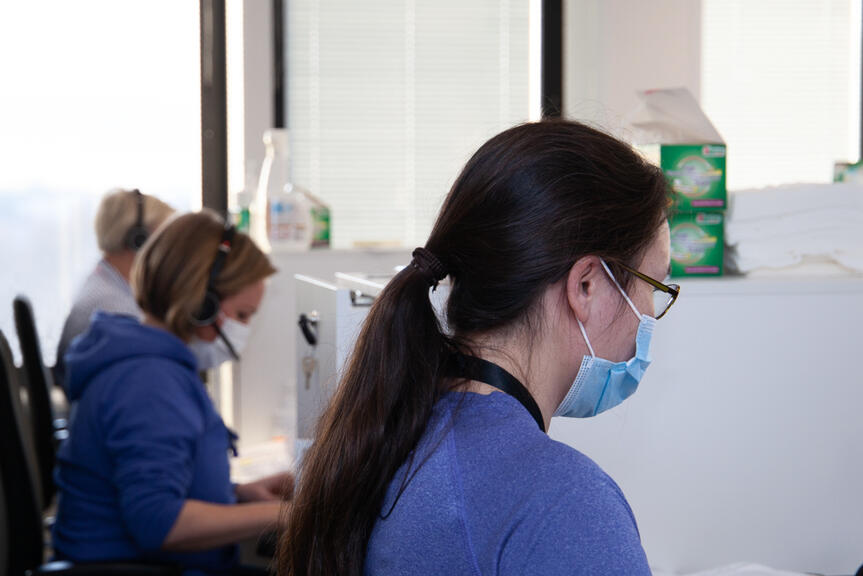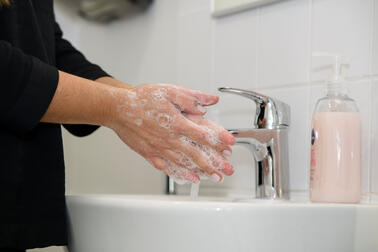
The rapid spread of the coronavirus in the Helsinki region has caused contact tracing and official quarantine orders to lose their effectiveness. People who have been exposed to the virus are now being asked to voluntarily self-isolate.
Omicron transmission outpacing tracing efforts
The Omicron variant of COVID-19 spreads much more quickly than the previous coronavirus variants, resulting in a much higher number of daily infections. Transmission rates have multiplied since the start of December, which has caused severe congestion in local efforts to trace infection chains.
The testing capacity of local healthcare providers has also been under increasing strain as the pandemic has worsened, resulting in longer wait times for COVID-19 tests. Delays in laboratory confirmations of infections has allowed the virus to spread before the authorities have had the chance to inform people about the results. The metropolitan area has decided to stop issuing official quarantine orders, as the delays due to the congestion have rendered them ineffective.
Contact tracing has likewise lost its intended effect due to considerable delays in testing and contacting the people affected. In addition, an ever-increasing number of infections are not coming to the attention of the area’s infectious disease authorities.
The decision to scale back contact tracing and official quarantine orders as the pandemic becomes more pervasive are in line with Finland’s national preparedness plan for pandemics, drawn up before the COVID-19 pandemic. In a 5 January 2022 statement, the Finnish Institute for Health and Welfare noted that contact tracing is most effective when the number of infections is relatively low. Situations in which access to testing, contact tracing notifications and official quarantine orders are delayed by several days or more than a week lower tracing’s effectiveness in preventing further infections.
Quarantine orders to be issued selectively
Local authorities will continue to send instructions to residents who have tested positive for a coronavirus infection in laboratory testing, and if necessary, they will issue an official order to quarantine, in line with the Communicable Diseases Act. The quarantine order may take several weeks to arrive.
It will no longer be possible to provide personal guidance or issue official quarantine orders for people who live in the same household or have otherwise been in close contact with an infected person.
As of 10 January 2022, metropolitan area authorities will begin limiting their contact tracing efforts to customers or residents of city housing facilities for at-risk groups, care institutions and healthcare units. Official orders to quarantine will no longer be issued for exposures occurring in families, workplaces, schools and daycare facilities. People who have been exposed are instead encouraged to take the necessary precautions to reduce the risk of infection. More information and instructions are available on the websites of the cities listed below.
We must all act responsibly as pandemic escalates
Helsinki Metropolitan Area residents must now work together to prevent the pandemic’s further spread, avoid overburdening of the region’s hospitals and healthcare facilities, and protect those close to us. If you have symptoms of any kind, even if they are mild, it is more important than ever to stay at home and inform people with whom you have had close contact. Even people without symptoms should be doing their best to comply with the current recommendations and restrictions.
People with mild symptoms should not book appointments for official COVID-19 tests unless they belong to an identified coronavirus risk group. The testing capacity of healthcare authorities should be reserved for people who need testing for medical reasons or are customers or residents of healthcare units, care institutions and city housing facilities for at-risk groups. All others are free to take home tests if they wish.
It should be mentioned that the ability of rapid tests to detect the Omicron virus is considerably lower than it was for other variants of the virus. For this reason, it is recommended that people with symptoms verify an initial negative home test with a new test in a few days. People with symptoms should avoid all contact with others, even if they have tested negative with a home test. Updated guidelines for symptomatic or exposed residents will be available on the cities’ websites.
Time to return to normal sick leave policies
Finland’s Communicable Diseases Act states that a physician specialising in infectious diseases in a public service employment relationship either with the municipality or joint municipal authority hospital district may order a person into quarantine or isolation if there is an obvious risk of the spread of a generally hazardous communicable disease and the spread of the disease cannot be prevented by other means. At present, however, the significance of official orders to quarantine or isolate as a means to mitigate the spread of the pandemic has deteriorated.
Administrative decisions of this nature tend to be used as grounds for daily allowances to compensate for missed work due to an infectious disease. Access to entitlements is however not a sustainable justification for continuing to enact policies that severely limit people’s individual freedoms.
Official orders to quarantine and isolate can only be issued to people with infections that have been confirmed by the appropriate healthcare authorities. When laboratory testing is not available to everyone, this puts people on unequal footing. The testing capacity of healthcare authorities should be reserved for people who need testing for medical reasons or are customers or residents of healthcare units, care institutions and city housing facilities for at-risk groups. Seeking out a COVID-19 test with the healthcare authorities for the express reason of receiving a daily allowance places an unnecessary burden on health services and causes congestion of important communications channels. This in turn leads to delays in the care of severe coronavirus cases and other illnesses and makes proper allocation of testing capacity more difficult.
In place of seeking out official orders to quarantine or isolate, people who have fallen ill with the COVID-19 coronavirus should therefore now return to observing normal sick level policies.
The metropolitan area cities of Espoo Helsinki, Hyvinkää, Järvenpää, Kerava, Kirkkonummi, Mäntsälä, Nurmijärvi, Pornainen, Porvoo, Tuusula and Vantaa will begin a gradual transition to these new operating principles on 10 January 2022.
References:
THL’s
assessment of the situation at the beginning of 2022(Link leads to external service)
, National Institute for Health and Welfare, 5 January 2022 (in Finnish).
National
preparedness plan for influenza pandemic(Link leads to external service)
, Ministry of Social Affairs and Health 2012 (in Finnish).
Photo: Virpi Velin


